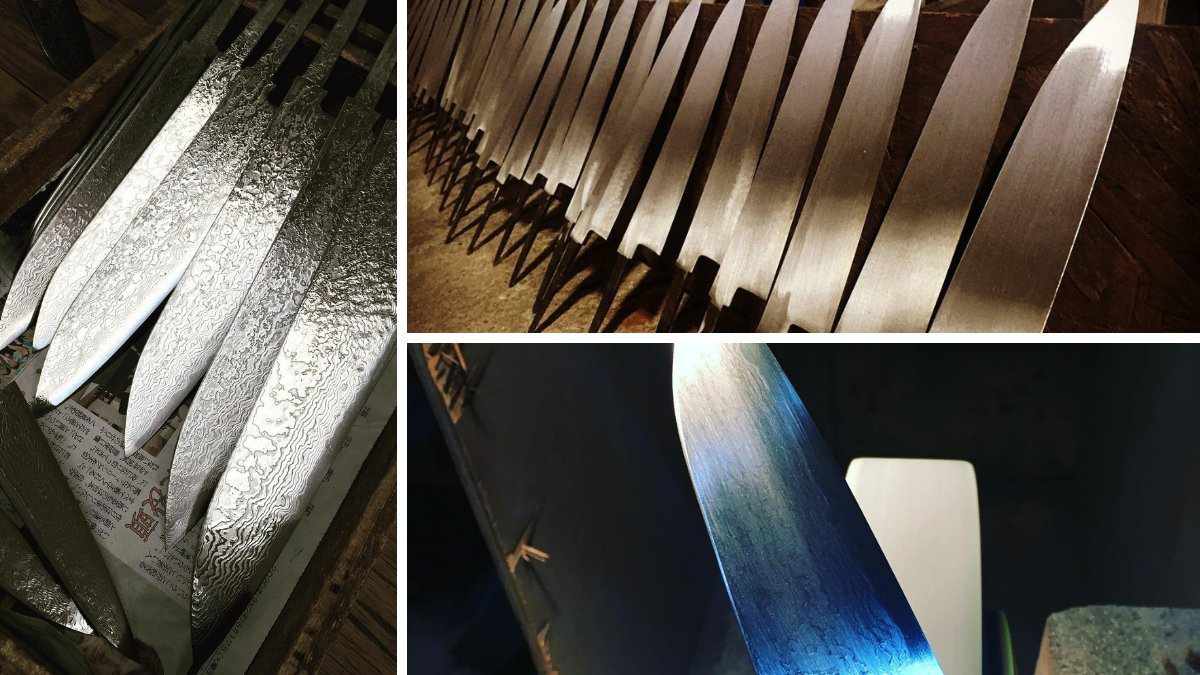
Brand
Tradition, Devotion, and Expertise Forged Over Three Generations
Iwai Blacksmith Company
- Est. 1961
- Echizen Uchi Hamono Knives
- Takeshi Iwai, Traditional Craftsman

History
Rising from the Ashes of War
The history of Echizen Uchi Hamono knives began in 1337 when a Kyoto swordsmith by the name of Chiyozuru moved to the Echizen area while looking for a place perfect for forging weapons. But, legend goes, as he devoted himself to making katana, he also began making scythes for the local farmers, starting a tradition that’s lasted for nearly 700 years.
During the mid-Edo Period (1603 – 1868), production of Echizen scythes and Echizen Uchi Hamono knives really took off, and soon their names were known all over Japan.
In 1979, Echizen Uchi Hamono was officially designated a Traditional Japanese Craft, the first bladesmithing art to ever earn the title.
The founder of the Iwai Blacksmith Company, Genmatsu Iwai, studied the craft under Motojiro Yamagata in Sakai, Osaka. After losing everything during WW2, he returned to his hometown of Takefu and started his own forge.
Today, two generations of his descendants continue his work as traditional craftsmen, pouring their heart and soul into every knife they make from start to finish with their own two hands.

Characteristics
Made Completely With the User in Mind
As one of the few workshops using traditional blacksmithing techniques, the smiths at Iwai Blacksmith Company apply their skills not just to knives but all manner of cutlery and new products. Throughout the process, the end user is always kept in mind, including how they will use the knife, the size of their hands, and how will they feel when holding the products. Because the knives are something to be used every day, they must be precisely balanced and fit perfectly in the hand. As such, it takes a lot of time to make just one Iwai knife.
A big part of the production process is the sharpening. You can’t feel them with your finger, but each Iwai knife features minuscule ripples that help food not stick to the blade as you slice ingredients.
You can only get this kind of quality at the Iwai Blacksmith Company, where tradition, devotion, and expertise have been forged over three generations.

Message to Customers
The Soul of the Artisan and the Love of the User
All products eventually deteriorate the more you use them. The same goes for knives. Their handles become worn, their blades chip. But even then, a knife never truly dies.
All signs of aging on a knife are different for each user, reflecting their habits and their personality. A knife’s “scars” are its history. And best of all, no matter how old a knife gets, it’s never too late to sharpen it back to its former glory and keep using it forever and ever.
You can’t get that with non-Japanese stainless steel knives. Japanese knives made with traditional techniques contain the very soul of their artisans, which makes users love them more and perform the necessary daily maintenance that eventually shapes the knife into their own one-of-a-kind creation.
Awards
1994: Takayuki Iwai was formally recognized as a traditional craftsman; changes his name to Takayuki Esshu.
2006: Takeshi Iwai was recognized as the youngest traditional craftsman in the industry at age 35.
![[KITCHEN (CHEF) KNIFE] THIS FORGED STYLE CREST SASHIMI KNIFE 200MM | ECHIZEN FORGED BLADES| IWAI CUTLERY](http://en.thebecos.com/cdn/shop/products/DSC00245_{width}x.jpg?v=1604309991)
![[KITCHEN (CHEF) KNIFE] THIS FORGED STYLE CREST SASHIMI KNIFE 200MM | ECHIZEN FORGED BLADES| IWAI CUTLERY](http://en.thebecos.com/cdn/shop/products/DSC00246_616167b9-d50a-43a2-9513-1e33b8fa21bf_{width}x.jpg?v=1604309994)
![[KITCHEN (CHEF) KNIFE] FORGED DAMASCUS SANTOKU KNIFE UKIGUMO 170MM | ECHIZEN FORGED BLADES| IWAI CUTLERY](http://en.thebecos.com/cdn/shop/products/DSC00240_{width}x.jpg?v=1604309678)
![[KITCHEN (CHEF) KNIFE] FORGED DAMASCUS SANTOKU KNIFE UKIGUMO 170MM | ECHIZEN FORGED BLADES| IWAI CUTLERY](http://en.thebecos.com/cdn/shop/products/DSC00241_{width}x.jpg?v=1604309681)
![[KNIFE] SHIJIMA BUSHCRAFT KNIVES BY TAKESHI IWAI CUSTOM KNIFE | ECHIZEN FORGED BLADES| IWAI CUTLERY](http://en.thebecos.com/cdn/shop/products/s0104-008-1_{width}x.jpg?v=1699045684)
![[KNIFE] SHIJIMA BUSHCRAFT KNIVES BY TAKESHI IWAI CUSTOM KNIFE | ECHIZEN FORGED BLADES| IWAI CUTLERY](http://en.thebecos.com/cdn/shop/products/s0104-008-2_{width}x.jpg?v=1699045688)
![[KNIFE] SHINKAN CAMPING MACHETE BY TAKESHI IWAI CUSTOM KNIFE | ECHIZEN FORGED BLADES| IWAI CUTLERY](http://en.thebecos.com/cdn/shop/products/s0104-009-3_{width}x.jpg?v=1699045768)
![[KNIFE] SHINKAN CAMPING MACHETE BY TAKESHI IWAI CUSTOM KNIFE | ECHIZEN FORGED BLADES| IWAI CUTLERY](http://en.thebecos.com/cdn/shop/products/s0104-009-1_{width}x.jpg?v=1699045772)
![[KITCHEN (CHEF) KNIFE] THIS FORGED WIND CREST DEBA KNIFE 180MM | ECHIZEN FORGED BLADES| IWAI CUTLERY](http://en.thebecos.com/cdn/shop/products/debaiwai02_{width}x.jpg?v=1604309921)
![[KITCHEN (CHEF) KNIFE] THIS FORGED WIND CREST DEBA KNIFE 180MM | ECHIZEN FORGED BLADES| IWAI CUTLERY](http://en.thebecos.com/cdn/shop/products/debaiwai01_{width}x.jpg?v=1604309924)
![[KITCHEN (CHEF) KNIFE] THIS FORGED WIND CREST DEBA KNIFE 160MM | ECHIZEN FORGED BLADES| IWAI CUTLERY](http://en.thebecos.com/cdn/shop/products/debaoo101_{width}x.jpg?v=1604309850)
![[KITCHEN (CHEF) KNIFE] THIS FORGED WIND CREST DEBA KNIFE 160MM | ECHIZEN FORGED BLADES| IWAI CUTLERY](http://en.thebecos.com/cdn/shop/products/deba0012_{width}x.jpg?v=1604309853)
![[KITCHEN (CHEF) KNIFE] THIS FORGED WIND CREST DEBA KNIFE 150MM | ECHIZEN FORGED BLADES| IWAI CUTLERY](http://en.thebecos.com/cdn/shop/products/DSC00242_{width}x.jpg?v=1604309771)
![[KITCHEN (CHEF) KNIFE] THIS FORGED WIND CREST DEBA KNIFE 150MM | ECHIZEN FORGED BLADES| IWAI CUTLERY](http://en.thebecos.com/cdn/shop/products/DSC00243_{width}x.jpg?v=1604309775)
![[KITCHEN (CHEF) KNIFE] FORGED KUROBUCHI SANTOKU KNIFE (AOGAMI SUPER STEEL) 170MM | ECHIZEN FORGED BLADES| IWAI CUTLERY](http://en.thebecos.com/cdn/shop/products/DSC00237_4a43f623-efcd-40d8-b22a-9491adcd9ae6_{width}x.jpg?v=1604309567)
![[KITCHEN (CHEF) KNIFE] FORGED KUROBUCHI SANTOKU KNIFE (AOGAMI SUPER STEEL) 170MM | ECHIZEN FORGED BLADES| IWAI CUTLERY](http://en.thebecos.com/cdn/shop/products/iwai002_{width}x.jpg?v=1604309570)
![[KITCHEN (CHEF) KNIFE] THIS FORGED BLACK KNIVES SANTOKU KNIFE 170MM | ECHIZEN FORGED BLADES| IWAI CUTLERY](http://en.thebecos.com/cdn/shop/products/S0104-001002_{width}x.jpg?v=1604309471)
![[KITCHEN (CHEF) KNIFE] THIS FORGED BLACK KNIVES SANTOKU KNIFE 170MM | ECHIZEN FORGED BLADES| IWAI CUTLERY](http://en.thebecos.com/cdn/shop/products/S0104-001003_{width}x.jpg?v=1604309474)